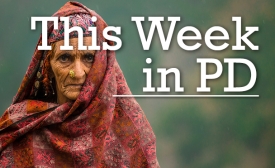film
This has been a fantastic week for Irish cinema. The achievements of directors, scriptwriters, actors and producers in nabbing seven Oscar nominations is the equivalent of the Irish football team getting to the World Cup final.
The Museum of Photographic Arts in Balboa Park will present a weekend of thought-provoking films at the sixth annual Human Rights Watch Film Festival from Jan. 21 to 24. [...] the festival will include five films and a special presentation that focus on the power of film to make a difference.
The movie was The Martian, and it had everything we should be promoting: It showed Americans as smart, resourceful, and innovative. It showed us as independent thinkers, but also as selfless team members who worked together when needed... And it showed America as a culturally diverse nation where people with talent could succeed, regardless of their race or religion.
A group of orphans and street children have been trained in photography and asked to capture the world around them […] It became known as the Murmushi Photo Project. As well as giving them a practical means by which they might one day make a living, it provides them with a visual voice through which they can document their worlds.
[…] Films are targeted at an international audience, which is already saddled with its own preconceptions of Africa [...] Why tie the film so explicitly to a cause that “needs immediate attention,” if not to profit on the outdated idea of that there is a foreign land that needs saving? Art can certainly dramatize real-life events, but it can’t be the earnest volunteer on the street with a Greenpeace clipboard.
Former military president, Ibrahim Babangida, on Tuesday said Nollywood was a veritable tool for cultural diplomacy and social re-engineering in Nigeria.

The role of women in public diplomacy is sometimes overlooked, but the work inspired and accomplished by women results in widespread impacts.
Japan and South Korea are building on a long interest in a country notable for its cheap labour and 90m-strong consumer market. From Hanoi’s point of view, there is a political imperative to draw more foreign investment because of structural economic problems such as bad debts and inefficient state companies, which have dragged Vietnam’s growth down from above 7 per cent a year before the western financial crisis to 5.4 per cent in 2013.







